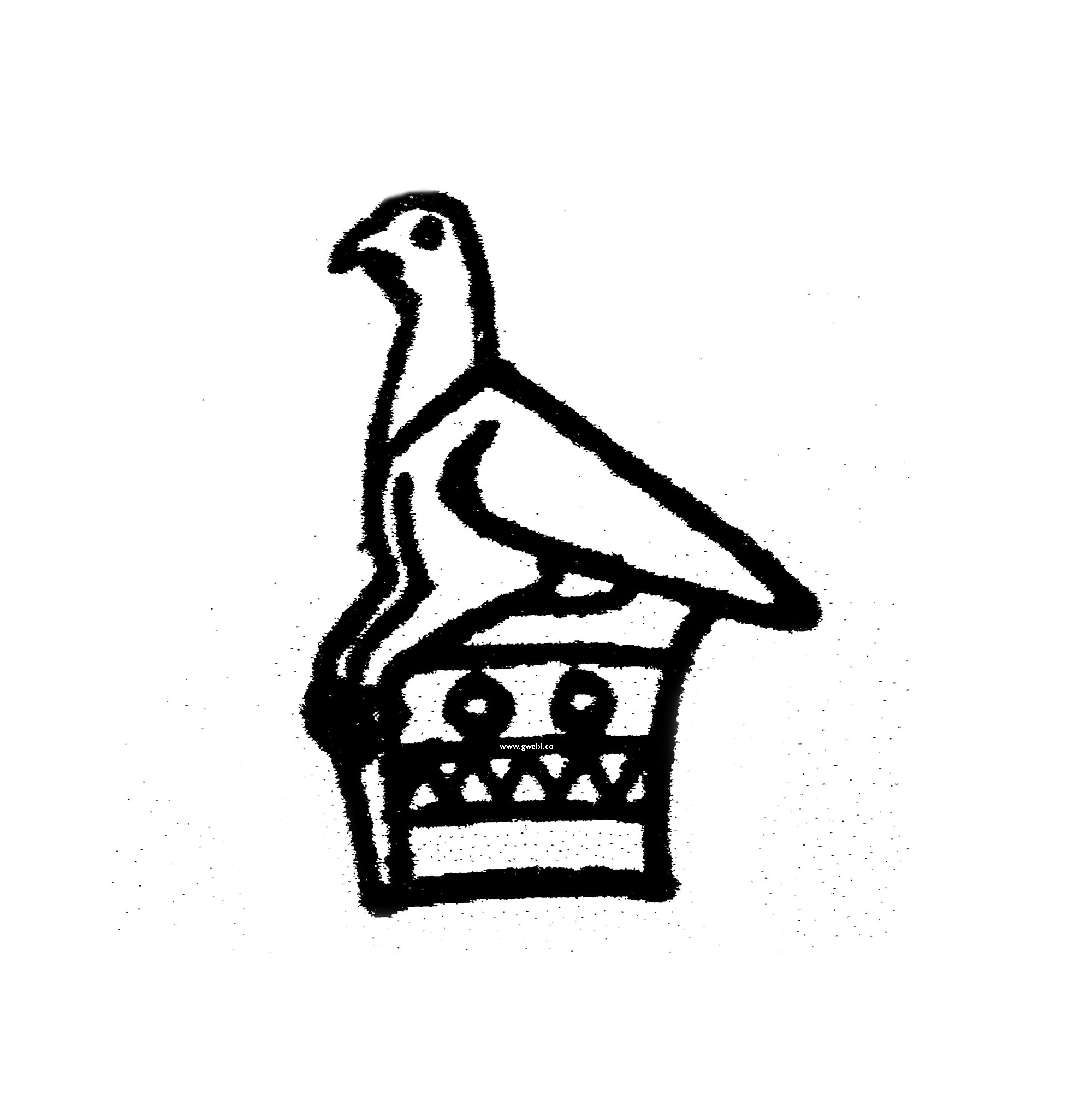Roll of Honour
Tribute is paid to former students from the Gwebi College of Agriculture that were killed during the Bush War on their farms or whilst on active service, and also political murders that were committed in the new Zimbabwe after 1980.
Mr Robin “Rob” Stanley Hughes.
18th October, 1973.
Robin enrolled at Gwebi College with Course 11. He was presented with a First Class Diploma with a Distinction in Animal Husbandry and a Lord Acton Prize in 1961.
During military service, Robin was a Territorial Army officer tracker called up by the Department of Wild Life. During 1973 he was introduced to the concepts of pseudo warfare prior to the establishment of the Selous Scouts regiment.
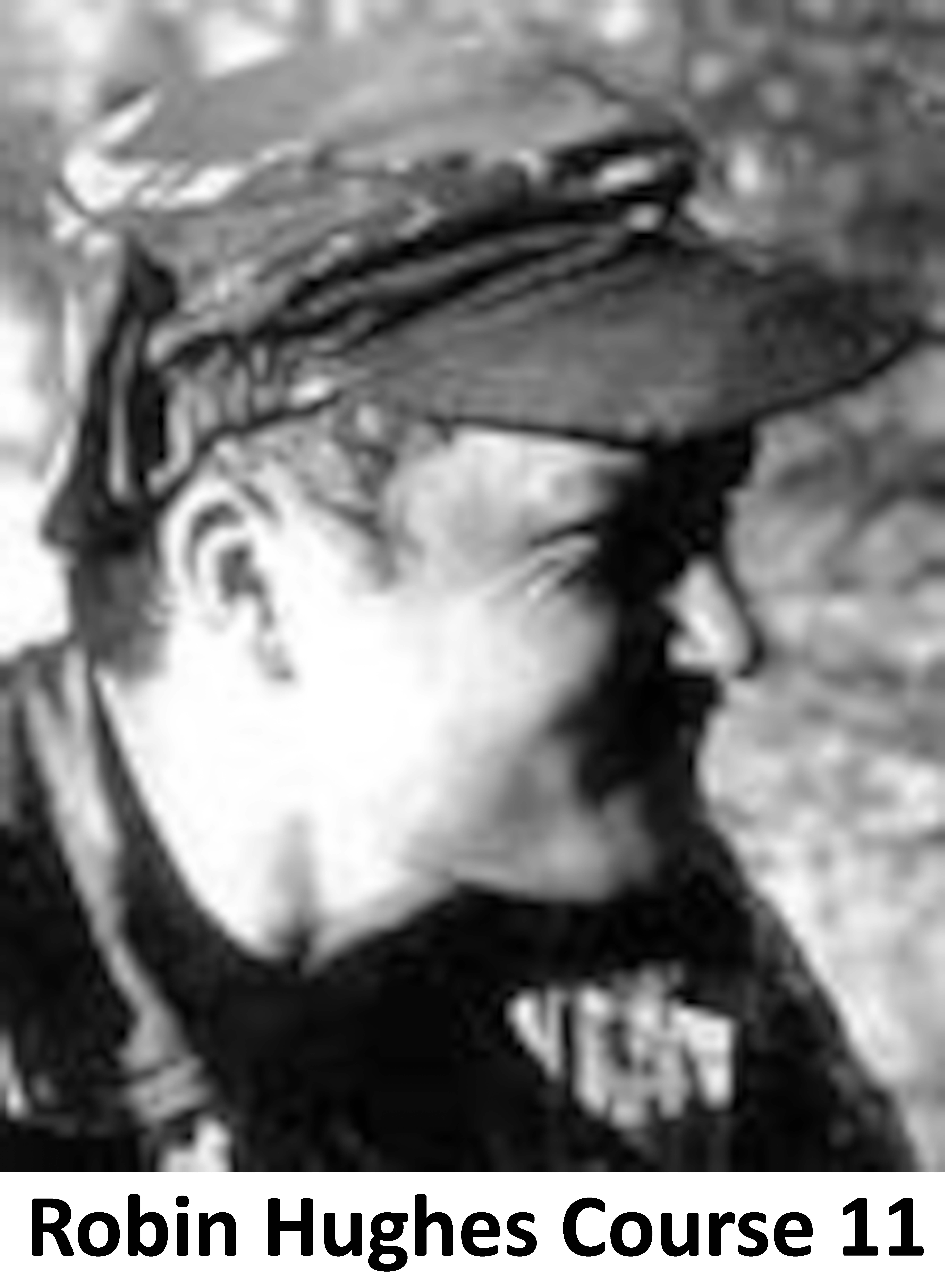 This narrative, written by Mike Bromwich - fellow National Parks officer - from the book 'Selous Scouts - The Men Speak' written by Jonathan Pittaway, with kind permission to be displayed on this website - kindly obtained by Colin Lowe - leads into the events of this tragic incident.
This narrative, written by Mike Bromwich - fellow National Parks officer - from the book 'Selous Scouts - The Men Speak' written by Jonathan Pittaway, with kind permission to be displayed on this website - kindly obtained by Colin Lowe - leads into the events of this tragic incident.
"Following the pickup and recovery back to Centenary a couple of days later I sat in on the debrief and later learnt that Robin Hughes, also from National Parks, had volunteered and would be joining the operation in just over a week. With the department structures as they were I knew Robin well enough even though we had never worked together. Apart from holding the rank of Lieutenant in the Tracker Combat Unit, which speaks for itself, Robin was an outstanding Ranger and well versed in bushcraft, an excellent hunter and fluent in Shona.”
After some intensive training by Stretch Franklin and Andre Rabie in pseudo work both Robin and Mike were inserted, along with Basil Moss’s African pseudo team into the heavily infiltrated Chiweshe Tribal Trust Land which was to be their operational area.
“When it was completely dark we moved off in file towards the contact’s village, Robin and I towards the back with an African soldier bringing up the rear. This was normal procedure and afforded the white element of the team protection from any undue surprises or locals. With the village being on high ground it was not long before we could make out the prominent feature; finding cover to cache our packs proved to be difficult in the open and overgrazed land. About half a kilometre from the target area we finally settled on a small patch of scrub where, once everything had been hidden, we gathered around for a final briefing from Robin.
The approach was slow and cautious; particular care was taken some hundred metres out as we moved towards the cattle kraal which was partially hidden by a few trees and a stone wall. We were actually walking on a path of sorts to the village. With the stone wall providing us with good cover from the side and one possible access route, the log cattle kraal protecting our back, and the village some fifty metres to our right on flat high ground, we had only our front to watch. As planned, Medhu, the RPD gunner, Robin and I positioned ourselves with our backs against the cattle kraal about a metre apart with weapons resting across our outstretched legs. As the three of us settled down Corporal Martin Chikondo together with the four remaining members of the group made their way up the ‘ruware’ (big granite rock) and into the village; for a while we could hear talking and then only the odd muffled voice.
Out of nowhere there was the sound of a shoe scuffing the ground and then to our front, out in the open, some three or paces from where we sat a group of men appeared. The split-second warning enabled us to raise our weapons and for a moment it would seem our presence in the shadows would go unnoticed. This was not to be and I don’t know exactly what happened other than the fact that they stopped and bunched up and enquired in the vernacular as to who we were. Medhu responded and then, using the known passwords, challenged the group to identify themselves.
Immediately the correct response was given Robin, Medhu and I opened fire on full automatic. Screams penetrated the noise of gun fire and we knew there was at least one wounded terrorist a few metres from our position. I was a little night blind from the muzzle flashes when someone grabbed me by the shoulder and pulled me up saying, ‘Come on’. As we ran towards and over the bodies I fired two or three short bursts into those lying on the ground.
As we started to move away gunfire erupted and we were fired on from the back some thirty to forty metres behind the wall. I crouched down and found Medhu at my side without his weapon; somewhere along the line he had dropped his machine gun. I cannot recall Martin or any of his team opening fire but someone threw a white phosphorus grenade setting alight a number of huts and, with the flames spreading, the whole area was lit up.
I later learnt that Martin and possibly one other had bayoneted the contact man and perhaps one or two others. After a few minutes I realised I was alone, the machine-gunner had disappeared. Knowing everyone would be jumpy, I carefully made my way to our RV and using the passwords entered the area. Most of the team was already there but Robin wasn’t!”
Following an anxious few hours wait hoping that Robin would walk in to the RV area Mike assumed command and they were instructed by JOC to meet an RAR vehicle convoy which would transport the pseudo group back to their base situated at some farm outbuildings in Centenary. Mike picks up the story again.
“Shortly after 6.30 a.m. I drove to the JOC and reported to the ops tent. Hickman, Captain Mick Graham and Dumpie Pearce were all sombre-faced. I immediately asked after Robin and was told as gently as possible that Robin wasn’t coming back, he hadn’t made it; he had been shot through the head and had died instantly ... I later learnt that we must have become separated moments after the contact. Robin had died making his way out of the area; in the dark he had taken a different route, become entangled in a barbed-wire fence a short distance from the kraal and it was there that he had been killed.”
Mike went on to say that in spite of the loss of Robin the operation had been deemed to have been an outstanding success by the military authorities. The initial contact had accounted for three dead and one wounded. This wounded terrorist had then made indications from a helicopter onto their camp where a further two terrorists were shot by the chopper tech. So, all in all, five dead terrorists and one wounded capture against the loss of Robin – a very high price to pay for one of National Parks’ finest rangers. Robin is survived by his wife Grettl.
Mr David “Dave” Aston Carshalton (aged 26)
27th August, 1976.
Course 22 from Chipinga
Dave was born on 29 June 1950, the second of three children to the union of Ralston (Dr Bob) Delanie Carshalton and Edith May Carshalton (née Seaward), his siblings being Mark and Deborah (Debbie).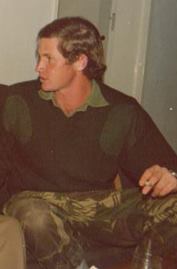
He was educated at Chipinga Primary School and at Grey College, Bloemfontein, South Africa. After schooling he attended Gwebi College and was then employed at Bon Espoir farm as the manager.
On that fateful day Trooper Dave Carshalton was with call-sign 24 Bravo, Grey’s Scouts, while on the spoor of a 70 member strong ZANLA gang in the Gona-re-Zhou area. The spoor was being rapidly followed on horseback in an attempt to make contact before they escaped to Mozambique.
After some five hours tracking, the troops encountered a well-prepared ambush, and in the initial fire-fight, Dave was sadly shot and killed, having been the lead scout on the left flank where the contact had been initiated. This action allowed the other members of the patrol time to dismount and skirmish towards where Dave had fallen.
G Cars and K Cars Fireforce deployed elements of 2 RAR to assist the horse troop, resulting in at least 40 deaths and several captures. Dave was on his own horse - a mare by the name of “Nuisance”. The horse survived and was discovered and recovered sometime later when she was spotted by engineers escorting a convoy through the contact area.
He was the first of the Grey's Scouts to be killed in action.
A brave man, David was a special person loved not only by his family but by so many people – he made friends so easily. The Chipinga community was devastated as Dave’s family was immensely popular, his father Dr Bob being the local medical practitioner.
He left his parents, brother and sister, and so many friends to mourn his passing.
Mr Paul Elliott Crouch (aged 25)
17th December, 1976.
Paul enrolled from Mtoroshanga and graduated with Course 23 at Gwebi College.
When farming in Aryshire, he was called up as Field Reservist, Police Anti Terrorist Unit, British South Africa Police. He was killed in action from a gunshot wound when ambushed in a vehicle on Dave Chadwick’s farm ‘Manyangau’ near Karoi and died with Field Reservist Mike Nielsen.
Mr David Patrick Bashford (aged 30)
24th December, 1976.
Course 17.
Born in August 1946 in Salisbury.
Field Reservist, Police Reserve, British South Africa Police was killed on active service in a vehicle accident.
David was born in Salisbury on the 8th September, 1946. After completing his schooling at St. George's College, David attended Gwebi Agricultural College with Course 17 where he graduated with a First Class Diploma and a Distinction in Practical. David was awarded the Campbell Shield for the best all round Second Year Student in Tobacco and was runner-up for the Romyn Cup and the Pfizer Prize for Livestock Judging.
After graduating Dave did his National Service with the Army followed by a period overseas, working for Goodwin’s Farmers’ Relief Service on various farming estates and learning about different methods of agriculture in the UK.
Upon returning to Rhodesia in the early seventies, he took over the family farm, St. Brendans, in the Karoi farming area, because his father, Pat Bashford, had become the leader of the opposition Centre Party and was based in Salisbury for much of the year. They grew tobacco and maize - the latter for home consumption and for fodder. Dave had a wonderful herd of Mashona cattle which was another source of income.
David later became Vice-Chairman of the Karoi North I.C.A. In 1975, David transferred his call-up commitment from the Army to the Police Reserve, and then followed this up by joining the local PATU section. Tragically David died from injuries received in an accident whilst on duty with PATU in Karoi. David, along with Warwick Lilford (C21) and Arnold Bathurst were in a pickup vehicle on the road between Karoi and Makuti, near the Vuti township turnoff, when they were sideswiped by a Swift pantechnicon on the 24th December, 1976. David and Arnold died at the scene and Warwick survived for another two weeks in hospital.
David was 30 years old and unmarried at the time of his death. He was buried in Karoi on 30 December.
Mr Warwick Powys Lilford (aged 27)
9th January, 1977.
Course 21.
Warwick was born in Sinoia on 31st August, 1949 to Fay Beadnell (née Cumings) and Guy Powys Lilford. Guy had come to Rhodesia from The Free State in South Africa with roots back to the 1820 Settlers.
Warwick, Field Reservist, Police Reserve, British South Africa Police, was injured in a vehicle accident when in a pickup vehicle on the road between Karoi and Makuti, near the Vuti township turnoff, when sideswiped by a Swift pantechnicon on the 24th December, 1976.
Field Reservist David Bashford and Arnold Bathurst died at the scene and Warwick was transported to Andrew Fleming Hospital in Salisbury. He succumbed to his wounds two weeks after the accident.
Mr Matthew Charles Thomas Brooks “Matt” (aged 23)
5th June, 1977.
Born in Bulawayo on 22nd January 1954, he began his education at St John's Prepatory School in Salisbury. He started secondary education at Falcon College and finally 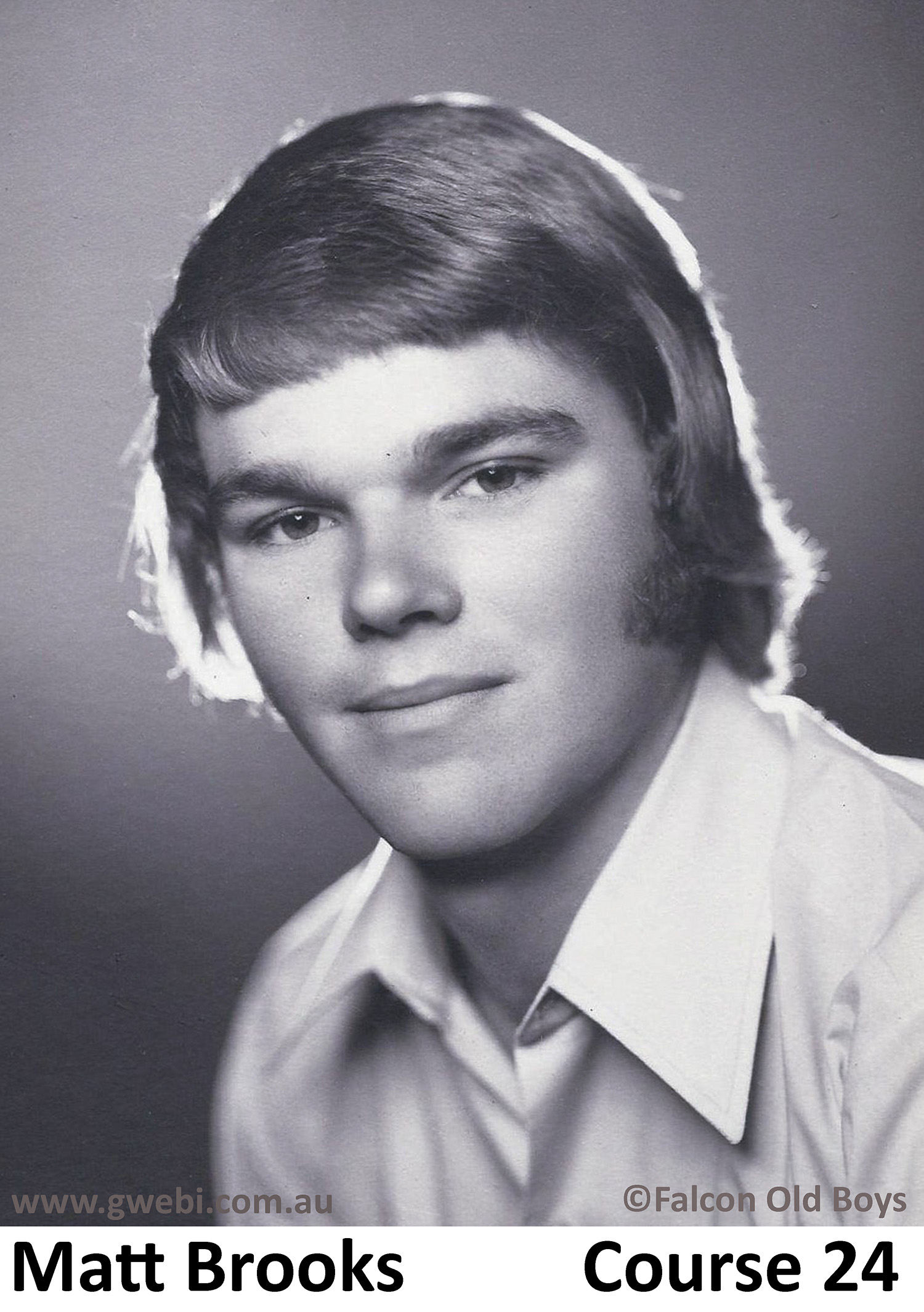 completed schooling at Churchill High School. He was a keen sportsman and represented both schools at rugby, cricket and water polo as well as playing rugby for Mashonaland Schools.
completed schooling at Churchill High School. He was a keen sportsman and represented both schools at rugby, cricket and water polo as well as playing rugby for Mashonaland Schools.
Matt enrolled at Gwebi with Course 24 in 1972 from Salisbury.
He helped prepare and exhibit the Hereford and Holstein cattle at the Marandellas, Umtali and Salisbury Shows in 1973. He had been awarded best all-round student in Poultry Husbandry and runner-up for Judging Dairy Cattle during his first year. He played Water Polo and in his second year, a goal in the Inter-Year Match helped secure the win for Course 24. Matt was awarded the Campbell Shield for the best all-round Second Year student in tobacco and was awarded his Diploma in 1974. 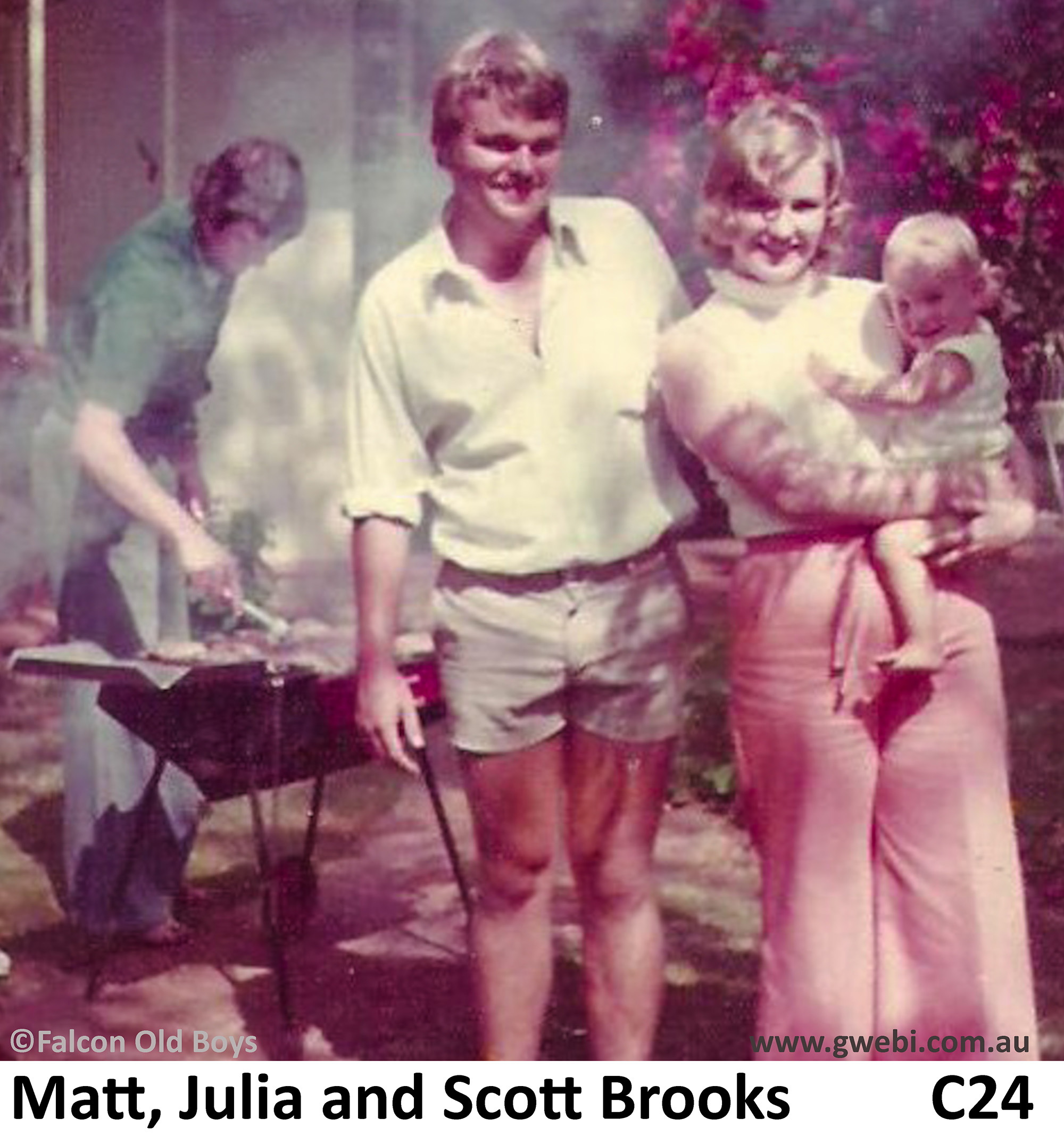
When called up for his National Service, Matt volunteered for the B.S.A. Police and he was accepted for NS Squad 9/74. Matt spent his National Service stationed with Traffic Section at Salisbury Central.
He served with the Marine Section as a field reservist on indefinite call-up on Lake Kariba. Matt applied himself with his customary vigour to operational duties on the Lake and within a short time he was made Section Leader in charge of a patrol boat. His qualities of leadership, cheerful resilience and ability for navigation proved invaluable to his PATU stick on their duties. Matt later transferred to Salisbury Province PATU as he was working for a Salisbury-based agricultural company. Matt served actively in various operational areas throughout Rhodesia before his untimely death on 5 June 1977 whilst trying to apprehend an absconding suspect.
Matt had married Julia Ailwyn and they had a son Scott. Mark was born a month after his passing.
"The Fallen", Gwebi Echoes and Falcon Old Boys website.
Mr Noel St. J. Webb "Wick".
17th August 1977.
Course 18.
Noel’s parents, Mark and Nellie Webb lived in Shabani where his father was the Milling Superintendent in charge of Planning on the Asbestos Mine. Noel had three siblings, twin sisters Marie and Wendy and a brother Jerome. The boys attended Plumtree School.
Noel did his pre-Gwebi practical with Peggy Pattulo, the well known Jersey breeder at Figtree. He also worked for Bill Smith at Texas Land and Cattle Company as well as working for a while growing lucerne and raising sheep on the Umgusa aquifer.
After graduating from Gwebi with C18, where he was also known as 'Wick' and was one of the recipients of the Lord Acton Prize for Animal Husbandry, Noel fulfilled his military commitment with the Rhodesian Air Force at the Thornhill Air Base at Gwelo.
Noel was married to Joyce Richardson whose own father, E.A. Richardson, had been murdered by terrorists on his ranch in the Belingwe/Shabani farming area on the 24th March, 1977. Noel and Joyce had not yet had any children.
Noel was working as a cattle manager on Wedza Ranch in the Belingwe farming district for Des and Rita Forbes when on Sunday 17th August, 1977 he went down to the local farm store to collect his newspaper. He was informed at the store that there were some mujibas in the vicinity. Mujibas, young African males who were often cattle and goat herders, were the eyes and ears of the terrorist gangs and invariably, after some rudimentary training, were promoted into AK carrying terrorists. Noel pursued them but was only armed with a handgun and he managed to shoot and wound the ringleader twice but they laid an ambush for him and overwhelmed and murdered him with knives and machetes.
The ringleader was killed by police in Bulawayo on a follow-up a short while later. The three other mujibas were captured by Security Forces and tried for Noel’s murder but were acquitted due to a lack of corroborating evidence.
Mr Denzil William Scott Dunn "Billy"
13th September, 1977.
Course 27, from Shamva.
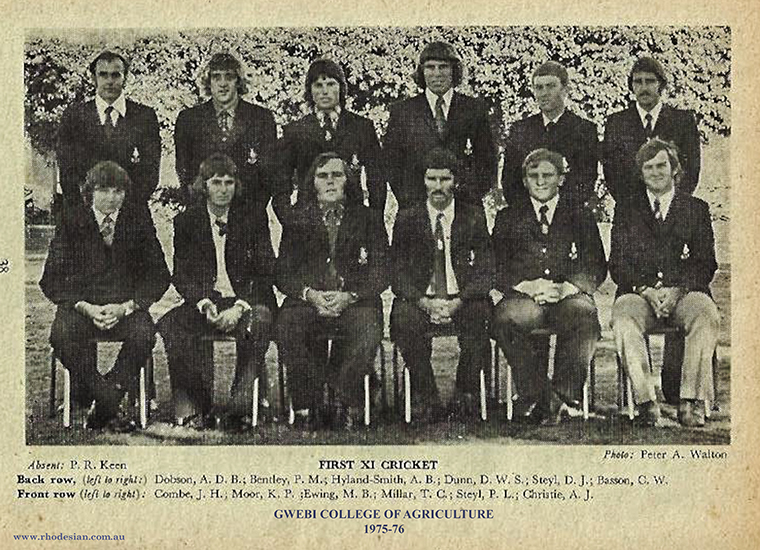
Billy represented the college in both rugby and cricket and was awarded the Seed Certifying Agencies Award for his essay on Seed production.
It was with a heavy heart that his father collected the posthumous diploma and award from Mrs Rollo Hayman, wife of the former Minister for Agriculture, on Diploma Day in 1977. This is the account that he wrote:
"On Tuesday evening, September 13, my son Billy was gunned down in cold blood by rabid young animals called, for want of a better name, terrorists. He was a lad who, not only I, his father, but I believe all who knew him, were proud to call "friend".
He was the epitome of young Rhodesian manhood who, after completing his national service as a soldier, recently graduated from Gwebi College and was ready and willing to live and work for his country. He was visibly thrilled at his recent transfer into the BSAP Field Reserve from his army unit, which would allow him to do his security commitments in the company of those he lived and worked with.
He was popular with European and African alike, but unfortunately had not yet been with his new labour force long enough to establish the very close relationship that would have warned him of his peril.
That evening, as he returned from his duties irrigating his lands he was captured when armed thugs pushed a brave lady, Mrs Ogilvy, whom they had captured while she was walking, at gunpoint in front of his vehicle. His chivalry prevented him from making a break for it, for I am certain it would have required a terrific struggle for this group of young thugs to capture him without the aid of a hostage.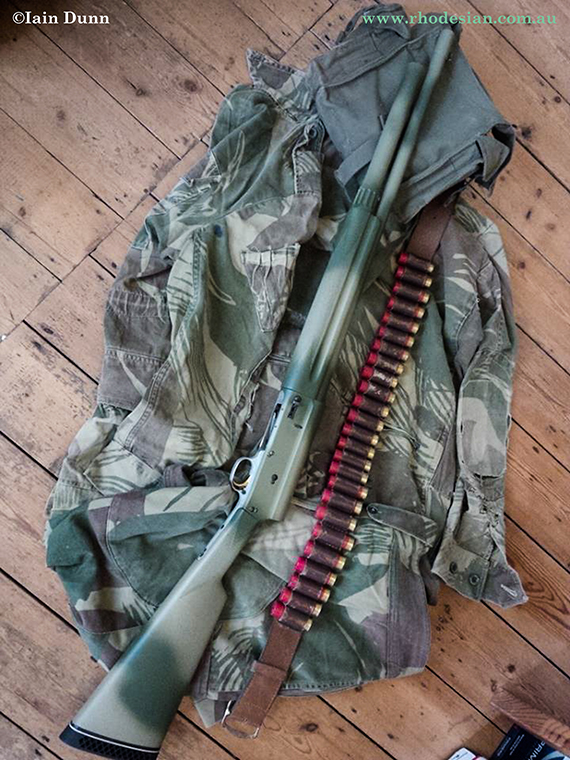
In a similar manner he was forced to drive behind this gallant lady, who was made to walk at gunpoint immediately in front of his vehicle, to her homestead approximately a kilometre away. There they waited for Mr Ogilvy to arrive.
Details are not clear but it was obvious that soon after his arrival both men attempted to intervene when one terrorist broke into the house after Mrs Ogilvy had managed to lock herself in and shooting commenced. The two men were gunned down.
...
I pray that God Almighty will guide those who lead us, and the rest of us will have the courage actively to support the moves that are made in His wisdom. If this happens the sacrifice made by Billy, and by so many others in this senseless conflict, will not have been in vain."
The letter, written by Denzil Dunn and published in the Rhodesia Herald, can be opened here.
Subsequently, Denzil was advised by employees about a stranger in Amms Mine Shamva compound where he was mine manager so went to investigate. He was fired at but killed the CT with his shotgun. The large ZANLA group were rushing to assist their member in the compound when they realised that a shotgun had continued to fire after the AK had stopped. They saw the mineworkers coming to the aid of their employer so they absconded.
There were other shootouts on call-ups and at Amms but he had at least one confirmed kill in retribution.
Acknowledgement to Gwebi Echoes, posts on social media and Kevin Moor's 'Spook Moor a rambling blog, Billy and Flash, Flash and Billy'
Mr John Barry Whitfield
5th February, 1978.
Course 27, from Umtali.
John Whitfield, from Umtali, was admired by everyone and known as “John Barry”, “Johnny” or "Spot" over time.
He was the second child, and son, of Patrick Arthur David Whitfield and Eileen Agnes Whitfield (nee Burke), his siblings being Peter and Jeanne.
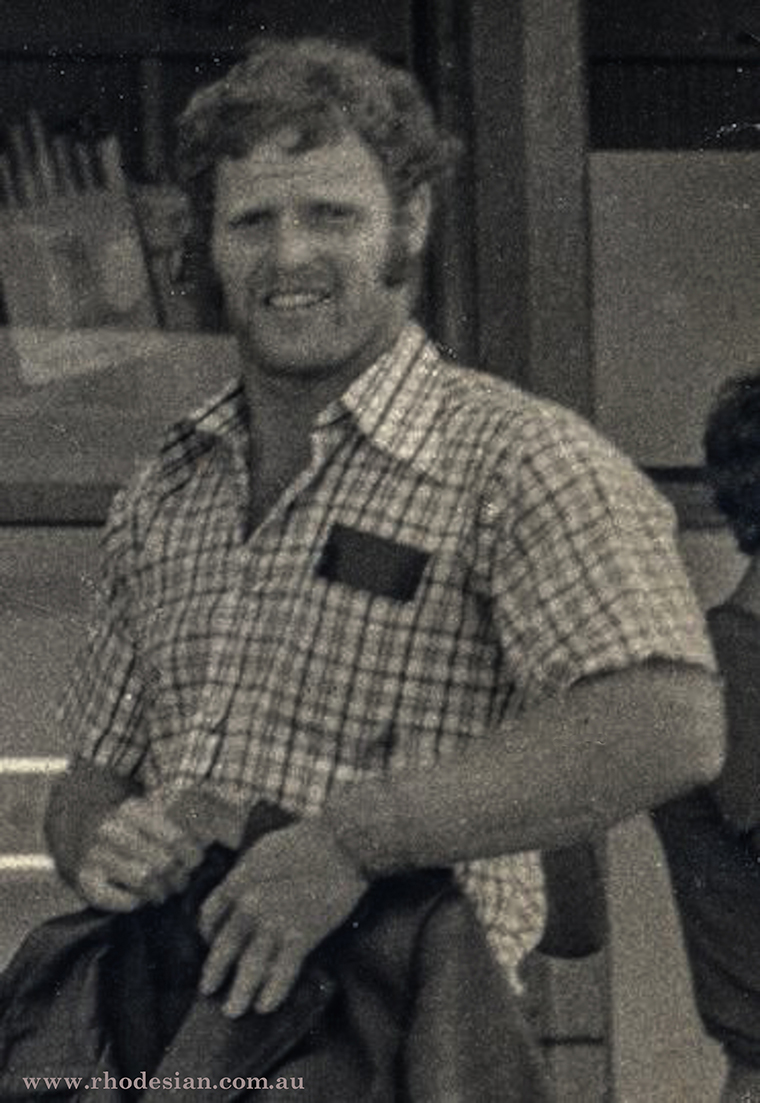 He was educated at Chancellor Junior School from 1962 to 1966 and then at Prince Edward School in Salisbury from 1967 to 1972. After completing his national service in 1973, he spent a year at the University of Natal (Pietermaritzburg), before going to Gwebi Agricultural College in 1975. While there he was given the name of “John Barry” to differentiate from other Johns.
He was educated at Chancellor Junior School from 1962 to 1966 and then at Prince Edward School in Salisbury from 1967 to 1972. After completing his national service in 1973, he spent a year at the University of Natal (Pietermaritzburg), before going to Gwebi Agricultural College in 1975. While there he was given the name of “John Barry” to differentiate from other Johns.
He was one of those larger than life characters who attracted attention and friends as he walked into a room. Much beloved by all who knew him, he had a presence, with a personality that oozed charm and great humour. He was very athletic and verging on playing rugby at the National level. While on a rugby tour with the college team to South Africa in 1976, John, together with 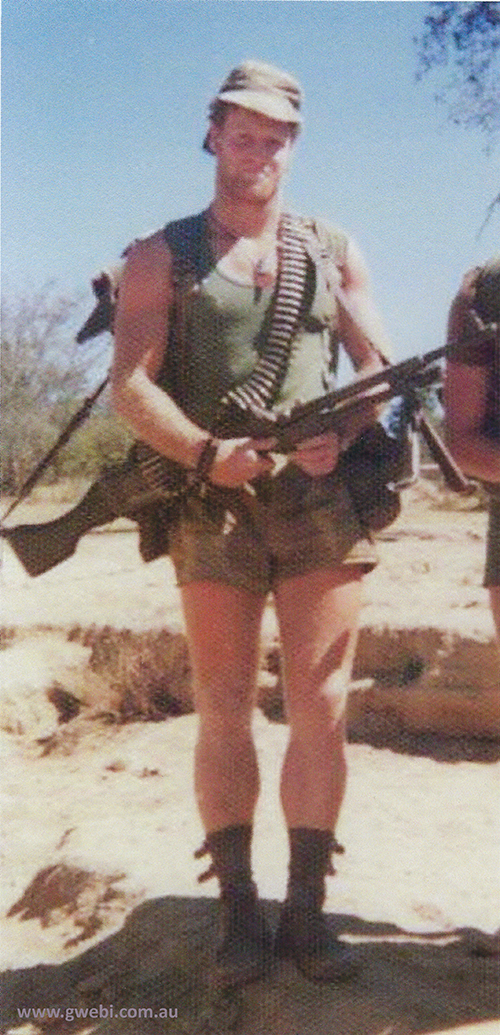 another powerful man but smaller in stature - Gerry Webster - rescued two young girls who were in danger of drowning at the Maitland River mouth in South Africa. He was that sort of man who would not give a second thought in helping others in trouble.
another powerful man but smaller in stature - Gerry Webster - rescued two young girls who were in danger of drowning at the Maitland River mouth in South Africa. He was that sort of man who would not give a second thought in helping others in trouble.
While studying at Gwebi, he served in the armed forces during the vacations and was with F Company, 4th Battalion, Rhodesia Regiment for a time. By 1977 he had successfully completed the Selous Scout selection course.
Six months after graduating, John was on Territorial call-up with the scouts. A highly decorated Scout who had been in the unit since its inception had been abducted by ZANLA during home leave in November 1976 in the highly subverted Nyajena Tribal Trust Land near Fort Victoria. Sergeant Head Wuranda SCR BCR, with his artificial leg, had reportedly been marched by his captures to Mocambique after being ‘sold’ by his father but he was never seen again or his body found.
A year later his wife was in danger so Commanding Officer Lt Col Ron Reid-Daly ordered his RSM with twelve men in a well-fortified mini-column to fetch Mrs Wuranda to bring her back for her protection into safety in married quarters at Nkomo Barracks. She was collected with her possessions but on the return leg on the same route on the same day - as there was absolutely no alternative - they were ambushed by a force of 50 ZANLA. Within seconds, Sergeant Chiutsi Ringisayi, Lance Corporal Richard Cook, Trooper John Barry Whitfield, and Trooper Martin Rungwe were killed. 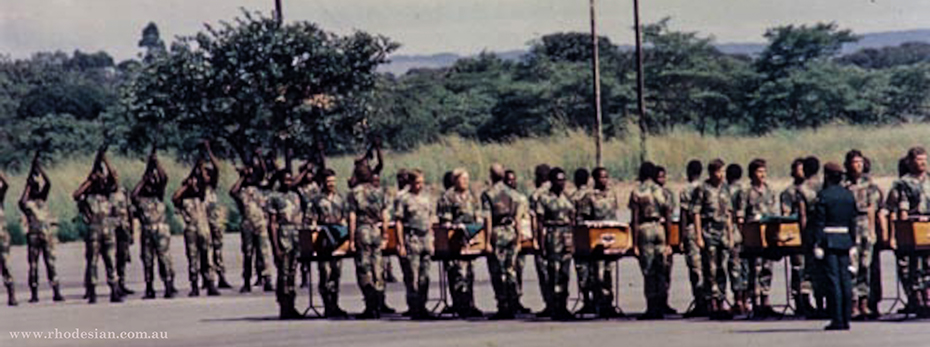 Trooper Basil Moss who had been wounded was casevaced but died in the helicopter before reaching Fort Victoria Hospital and his brother solemnly returned to base without him.
Trooper Basil Moss who had been wounded was casevaced but died in the helicopter before reaching Fort Victoria Hospital and his brother solemnly returned to base without him.
John Barry left his father, brother and sister to mourn his passing. He would never have wanted it, but his life could not have passed unheralded. A fellow soldier, Rusty, whose life had been touched by the gentle giant, penned this poem which was printed in the Rhodesian Herald with his Death Notice. Every now and then it does another round on social media and those who were privileged to know John Barry remember him again with such pride:
"Thoughts of a Troopie
Ten years old and four feet high
Hisory and U.D.I.
"Today we've struck a blow" said he
"For Justice and Christianity,
For Principle we've made a stand,
Courageous people, splendid land
Civilized we stand or fall
God save the Queen, God bless you all."
And like the years, good friends have gone
Dave and Richard, Mike and John
Crash and ambush, mine and mortar
Cold and heat and dust and water
Freckled David, laughing Paul
and Pete my bravest friend of all.
Write their names on Rolls of Honour,
Scripted bold in golden splendour.
For us will be no victory day,
The dogs of war have gone astray.
Now Principle becomes surrender,
Expediency, the legal tender.
ls justice just for those who shout?
Is this what Christ is all about?
Will someone tell us why we fight?
What once was wrong is now what's right?
Where am I going? - where have I been?
Somewhere... Nowhere... in between
Years of waste - and so I cried,
The day my good friend Johnny died."
Steve Bennett, with posts and photos from social media and Gwebi Echoes.
Mr Charles Hugh Olivey (aged 28 years).
15th May, 1978
Course 21.
Charles is the twin brother of Tony, born on 9th May 1950, and they were the youngest of six children to John Richard and Mary Madge 'Mickey' (née Tollner) Olivey at Sawerombi Farm on Pork Pie Mountain above Melsetter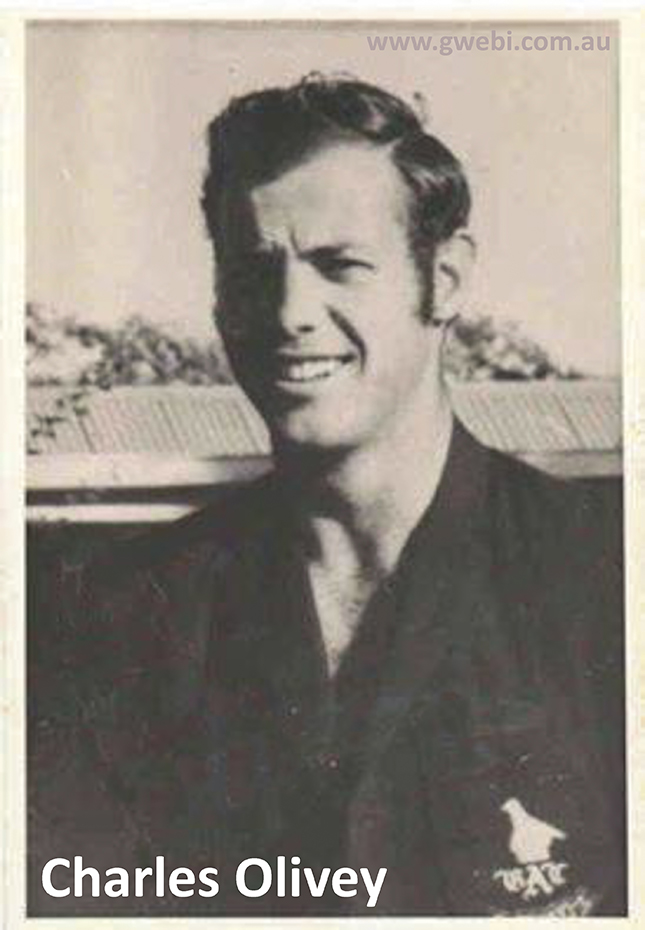 . The tiny boys were brought up in a shoebox as they were so small.
. The tiny boys were brought up in a shoebox as they were so small.
Charles's father had bought the farm in 1928. During World War II, John Olivey was awarded the Military Cross after serving with the Long Range Desert Group with distinction. He married Mickey while on leave from the army as they had met when she was teaching in Melsetter. John was also a lay-minister and was instrumental in the building of the Anglican Church of St George. When he died in 1968, the twins ran the farm with their mother.
Charles attended Melsetter Primary, Ruzawi, Chancellor Junior then Umtali Boys' High. He was prefect at Kopje House and was a keen rugby player with the 1st XV. He continued to play rugby when he was a student with Course 21 at Gwebi College of Agriculture until 1971. He also played water polo at Gwebi and rugby for Old Hararians 1st XV as a flank forward as well as country district representation for Manicaland.
He completed National Service in Intake 119 and passed out as Platoon Sergeant from Gwelo School of Infantry and was posted to 2nd (Independent) Company in Kariba. He served as a Territorial after being commissioned as Lieutenant in the 4th (Independent Company), Rhodesia Regiment based in Umtali. He was a strong leader and friend to many - with an outgoing, mischievous personality.
Charles was employed by Mike Buttler as the Stockfeeds representative for the Farmers' Co-op and travelled extensively throughout the Eastern Districts. He returned to Sawerombi Farm with his girlfriend Shelagh Page, a Rhodesian hockey international but was often away on business. A ZANLA gang attacked the homestead so Charles returned to inspect the damage after the military had cleared the road to the farm for landmines. When he parked his vehicle in his parking space within the homestead he detonated a landmine and was killed instantly.
He was mourned by his mother Mickey, siblings Annabel, PJ 'Peter', twins Ros and Dee and his twin Tony and countless friends.
Mr Kenneth Cecil “Ken” Gifford (aged 41)
6th July, 1978.
Ken was one of four childern to Cecil John and Gertrude Olive Gifford, and his grandfather, Alfred Samuel Gifford, arrived with the 1894 Edenburg Trek.
He was educated at Chipinga Primary School and then at Umtali Boys High.
Ken was on Course 8 at Gwebi College and graduated with a Distinction in Practical in 1958.
The family farms at Chipinga were Wolverhampton and Wolfscrag. Ken was gunned down by a ZANLA gang when he was underneath a Caterpillar servicing it.
He was survived by his mother and father, wife Jean and their three sons, a brother and two sisters. Within two months of his tragic death, his father died and six months later one sister, Rosemarie Hacking, was killed in Odzi by a landmine.
Steve Lunderstedt.
Mr Pieter Jacobus "Boet" Cloete (aged 27)
8th August, 1978.
Graduated in 1973 with Course 23 and came from Salisbury. He was runner-up to the Johnston Prize for excelling in Engineering and helped prepare and exhibit the Hereford and Holstein cattle at the Marandellas, Umtali and Salisbury Shows in 1973. A keen athlete, he contributed many points to help Course 23 to win the Fielding Trophy, played in the rugby team and joined the tour to South Africa.
When farming in Centenary, he was killed in action. He had been called up as Field Reservist, Police Reserve, British South Africa Police and died from wounds he received in a contact.
Mr Robert Leslie Smallman (aged 25).
11th September, 1978.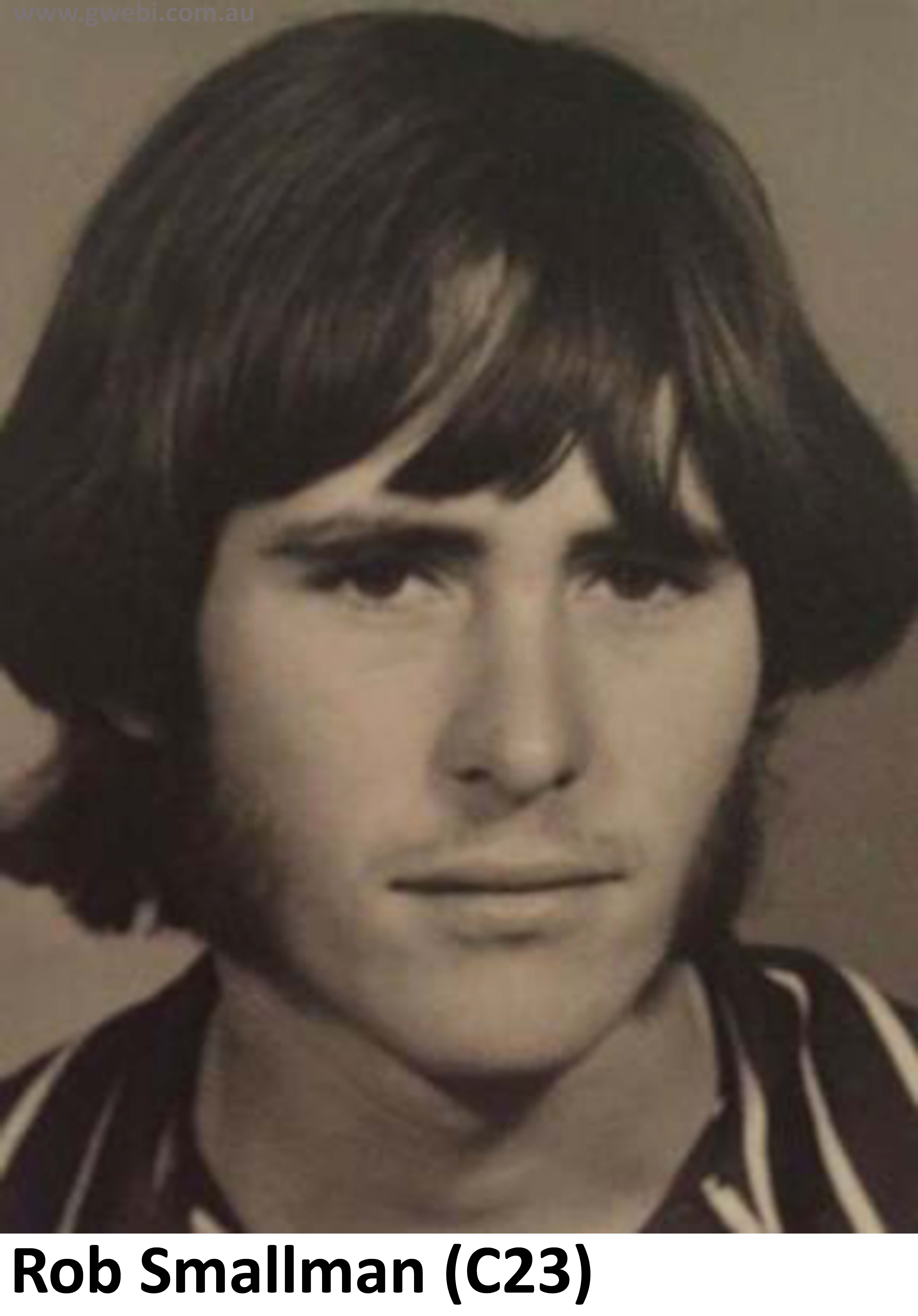
Born in the UK and educated at Chaplin School in Gwelo.
Enrolled at Gwebi on Course 23, 1971-73.
Completed his National Service with Internal Affairs.
Rob, also known as "Bean", was married and employed on Charleswood Estate, 16km from Melsetter. He was with the Police Reserve and had been on convoy duties for the previous week.
Rob was ambushed by a ZANLA gang on the Tilbury Road just above Charleswood Estate on his way home after dropping off his father in law Mike Ferreira who was going to commence convoy duty. He had his assistant manager, Andy, and some guards and Doberman dogs with him in his vehicle. The passengers were not hurt and survived.
Rob is survived by Rosemarie Smallman née Ferreira. She was 7 months pregnant and their son is named Robert after his father.
Mr Arthur Stockwell Topham.
7th November, 1978.
Course 23, from Sinoia.
Graduated with First Class Diploma. Arthur regularly represented the college at cricket and hockey and was also Captain of Tennis.
When serving as a Sergeant with A Squadron, Rhodesian Armoured Car Regiment he was killed in action. The patrol was returning to Chipinga after checking on deserted farms. The Ferret was being driven by Trooper dos Santos and Arthur was sitting in the turret when it detonated a land mine and he was killed by the blast.
Mr Robert James “Rob” Gash (aged 28).
15th February, 1979.
Course 23, from Umtali.
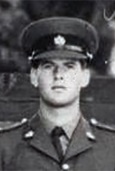 Rob was born in England in March 1950 and when aged eight years went with his parents to settle in Kenya where he was educated, firstly at Nyeri Primary School and then at the Duke of York secondary school. In his final year at the Duke of York he was deputy Head Boy.
Rob was born in England in March 1950 and when aged eight years went with his parents to settle in Kenya where he was educated, firstly at Nyeri Primary School and then at the Duke of York secondary school. In his final year at the Duke of York he was deputy Head Boy.
Circumstances forced the family to leave Kenya, the family settling in Umtali, and in 1969 Rob then attended the Natal University to study geology. He asked (and received) permission to leave university to rather study farming – his real love.
He enrolled with Course 23 at the Gwebi College of Agriculture and received his diploma in 1973.
Called up to do his National Service for one year, Rob decided to rather sign on for three years with the BSAP, attesting as 9024 in July 1973. His philosophy was simple:
“I love this country, and if it is worth living in it is worth fighting for.”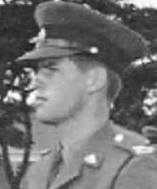
He was posted to Bindura in the uniform branch and after a time doing ground coverage was transferred to the CID. Enjoying the life style Rob signed on again when his three years were up and he was promoted to Detective Section Officer in 1977.
He had married in June 1976.
Three weeks before his 29th birthday, on 15 February 1979, he and Detective Constable Choba travelled from Mount Darwin to the Chesa Purchase Area to investigate a possible sighting. On their return drive they were ambushed and Rob was killed instantly. Detective Constable Choba managed to escape the ambush and ran to seek assistance.
Left to mourn his passing were his parents, his wife, and his young son David Robert (born September 1977). He is buried in Umtali.
Mr James Firman Murphy (aged 35).
28th February, 1979.
Gwebi student, Course 15.
Section Leader, Police Reserve, Special Branch, British South Africa Police, was killed in action. He died when his vehicle detonated a landmine in the Mhondoro Reserve. His semi-military cremation service took place on 5th March 1979 at the Warren Hills Crematorium.
Mr Basil John Stuart Kearns (aged 41)
15th April, 1979.
Schooled at Michaelhouse.
Course 8 graduate.
Basil was a keen sportsman playing hockey for Natal Schools but he really excelled at polo. He first 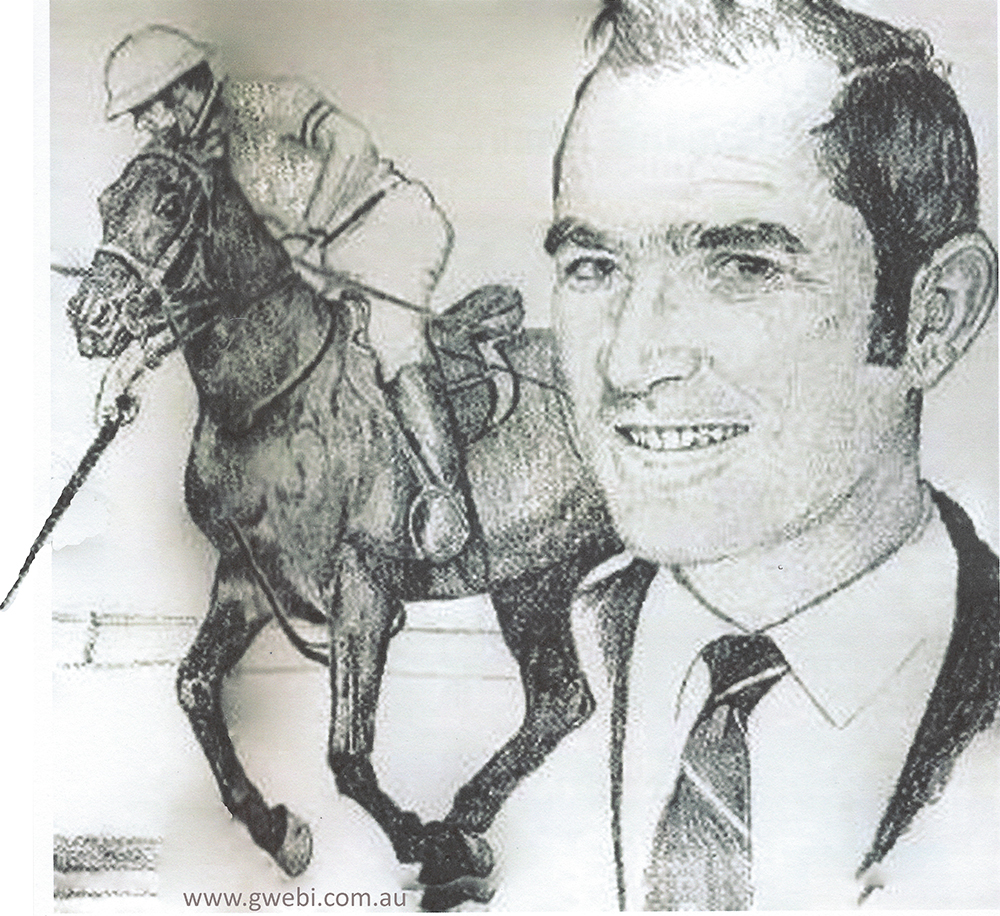 represented Bindura as a schoolboy to the time his life was tragically ended in April 1979, three weeks after being hit in the head by a bullet in an ambush.
represented Bindura as a schoolboy to the time his life was tragically ended in April 1979, three weeks after being hit in the head by a bullet in an ambush.
The forty-one-year-old Mtepatepa (Bindura District) farmer's vehicle was ambushed as he travelled towards Salisbury to carry out duties as a Shona interpreter in the 1979 elections. Renowned for his fighting spirit and courage even as he lay critically wounded in his hospital bed, many of his friends believed that if any man could pull through, it would be he. But the odds were too great, and Rhodesia lost another top sportsman and farmer in the war.
Born at Bulawayo, Basil Kearns was educated at Michaelhouse in Natal and graduated with Course 8 at Gwebi in 1958.
He went on to become an established member of the national Rhodesian side first in 1952 and finally in the triumphant Benson and Hedges series against South Africa in 1978. After a bad accident in 1972 he was out of polo for a long spell, but he fought back from the bottom, first with Rhodesia B and eventually reclaiming his full national number four position.
In 1966, he was the highest handicapped player (a six) in the country and featured in perhaps the most stirring Test yet played against the Springboks. This was at the Salisbury Sports Club North Avenue field when they faced a formidable South African team. Twice Basil Kearns had to summon all his experience to equalise for Rhodesia at 2-2 then at 6-6 and they secured a win.
Kearns went on to captain Rhodesia in later internationals and his career included matches against Argentina, Peru, Uruguay and New Zealand, while he also played polo in Kenya and England, where he became friendly with the Duke of Edinburgh and actually unseated him in a match. When playing in England he was presented with the 'best polo pony of the season' cup by the Queen.
When he captained Rhodesia at the 1964 South African Games, he got the name 'Hawkeye' Kearns as he showed such a fantastic eye for the ball. But his prowess as a player was but a small part of Basil Kearn's make-up. He was a generous sportsman in the true sense. In spite of the great distances he had to travel, he was for many years the driving force behind the Salisbury Sports Club polo section. He could be seen there at every meeting — encouraging new and young players, lending horses and giving instruction where needed. He gave unobtrusive financial assistance when such help would promote the game and at every away tournament he transported horses for the club. A life member of Salisbury Sports Club, he was captain of their polo team for several years and was also chief national umpire for the three years preceding his death.
Extracted from Rhodesian Sport Profiles, 14th February 2012.
Mr Charles Albert “Charlie” Rosenfels (aged 41).
24th April, 1979
Charlie was born in the Marula district of Matabeleland on 23rd April 1978. He was the eighth out of nine 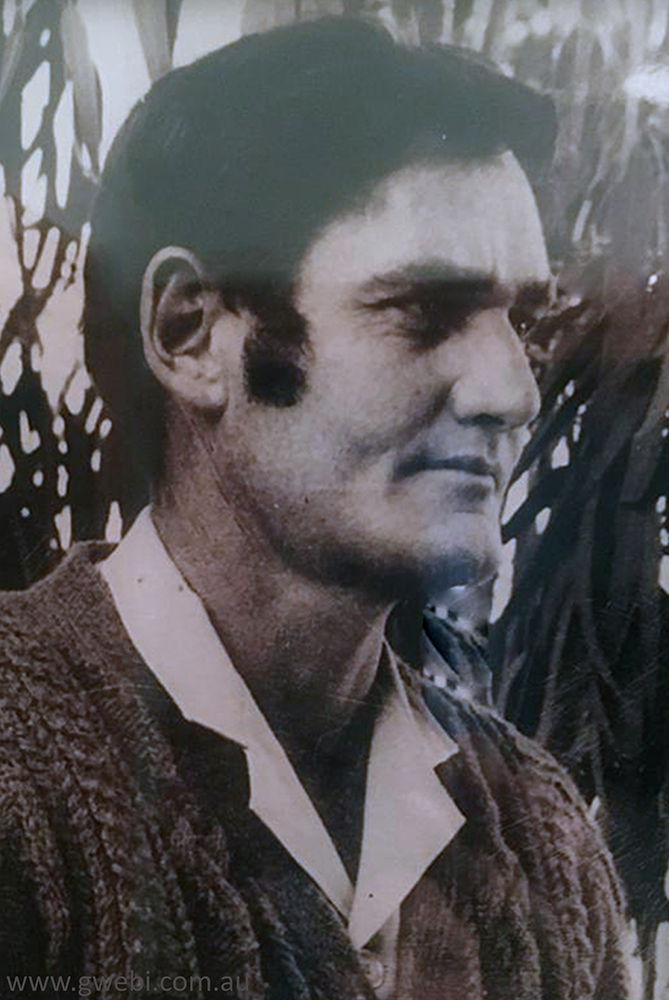 children to Sigmund Julius “Boet” Rosenfels and Evelyn Lois née Shone. His father was born in Bulawayo in 1896 and his mother is from Bedford in South Africa.
children to Sigmund Julius “Boet” Rosenfels and Evelyn Lois née Shone. His father was born in Bulawayo in 1896 and his mother is from Bedford in South Africa.
Charlie married Pamela neé Rattray and they had three children.
He enrolled at Gwebi with Course 8, and was the third student from this course to be killed in the bush war, all within one year of each other.
Charlie attested into the Police Reserve and was an active participant in the Police Anti Terrorist Unit (PATU) on continuous call-up despite almost losing the use of one leg at an early age. In January 1975 he was the recipient of the Police Reserve Long Service Medal (PRLSM).
When travelling to Kezi along the Mangwe/Kezi road, through the CSC's Taylor's Block Farm, he struck the landmine in a short-wheel base Land Rover in a convoy with Army vehicles. He was killed the day after his 41st Birthday and another six sustained minor injuries.
Mr Trevor John "Spotty" Speight.
18th July, 1979.
Course 24, from Gadzema.
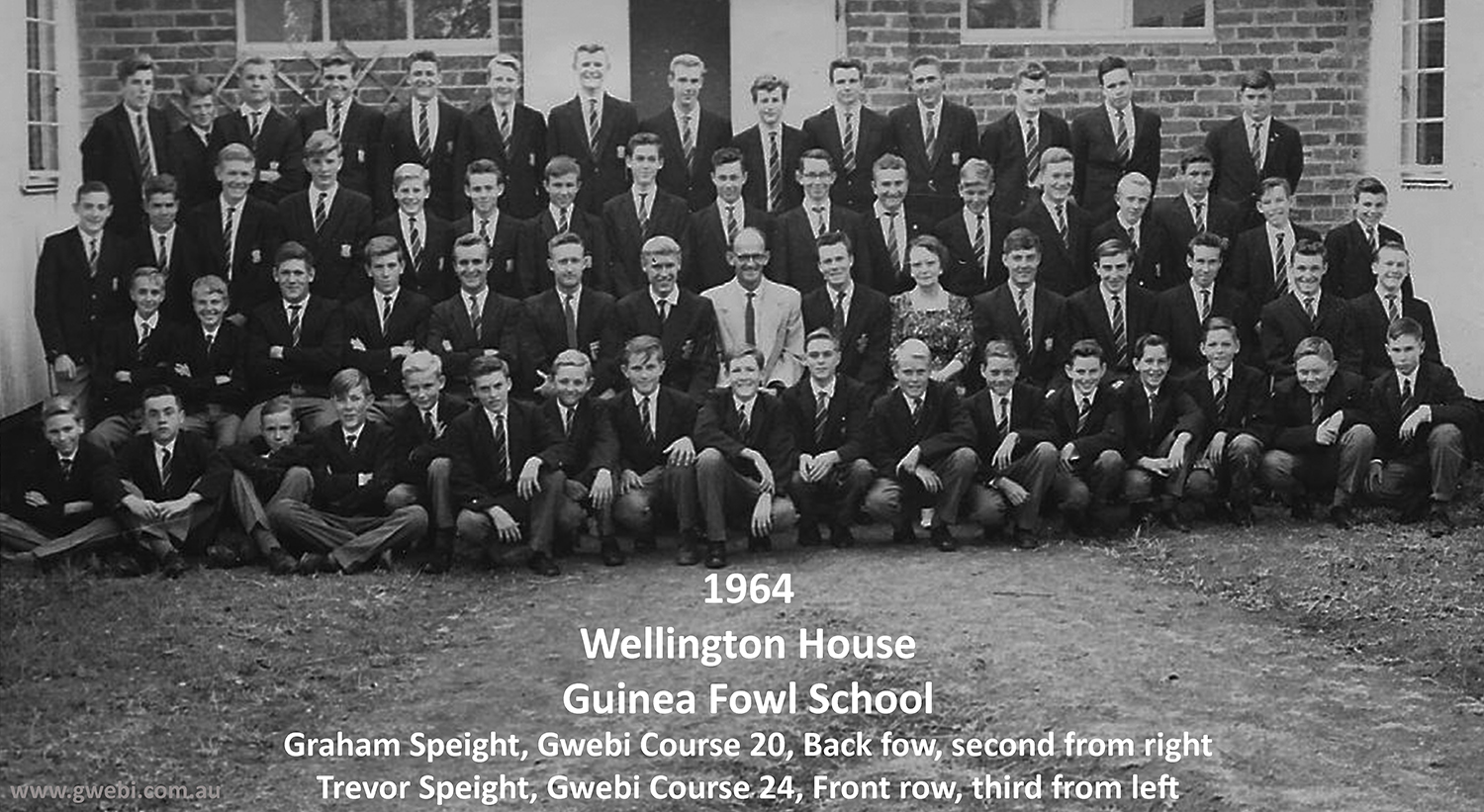 Trevor grew up on a tobacco farm next to the Beri River in Gadzema and attended Dudley Hall Schol at Norton then was in Wellington House at Guinea Fowl School.
Trevor grew up on a tobacco farm next to the Beri River in Gadzema and attended Dudley Hall Schol at Norton then was in Wellington House at Guinea Fowl School.
Trevor was the younger brother of Graham of Course 20. He was at school when Johanna and Johannes Viljoen were shot on the isolated Nevada Farm which was on the other side of neighbouring Fynn and Thomas farms in 1966. They were the first farmers to die in their own homestead during the Bush War.
Trevor was farming in Umvukwes when he was killed through a gunshot wound on call-up as a Corporal with B Company, 1st Battalion, Rhodesia Regiment. A posting on Rhodesian Services Association on Facebook stated "He was shot in a completely arbitrary contact. The stick was sitting on their packs shooting at terrs about 1 km away gapping it. The bullet hit him in the neck and was the only round that came anywhere near the stick."
Mr Brian L. T. Eastwick
17th August, 1979.
Graduated with Year 12 in 1962 at Gwebi.
Brian married the daughter of Cecily Parker (matron of Gwebi when he was a student).
His name is on the Police Reserve roll. He was farming in Centenary when he was murdered.
Mr Brian Richard Rundle Dawe (aged 40)
26th April, 1982.
Course 14.
He was born in Bulawayo on 28th January 1942, the son of Harold and Evelyn, and attended Milton High School.
Brian graduated at Gwebi in 1964. In the mid-seventies he was employed by the Cold Storage Commission as a Field Inspector and based in Salisbury.
He was married to Patricia with two young children when he took up a manager’s position with a privately owned ranch called Mvaami in the Chinoya farming area. On a Monday evening, when Brian was watching television, his domestic worker brought three assailants, all armed with AK47s, into the house. They came up behind him on the sofa and their spokesman said, “We want money!” When Brian replied that he didn’t have any, the spokesman opened fire with a burst that killed Brian instantly.
The Bull Terrier that was lying next to him launched itself at the attacker but was shot too. Brian’s wife used this momentary distraction to scoop up the two children, and dash down the passage to the bedroom block. She got there just in time to close and lock the door before her attackers crashed against it, bawling threats at her. Fortunately there was a loaded rifle in the bedroom which she fired through the door. It jammed when the wrong ammunition was reloaded but fortunately the intruders didn’t know this and fled from the farmhouse.
The next morning several white farmers gathered at the scene of the murder to see whether they could help in any way. A policeman swaggered out of the house carrying the dead Bull Terrier and told the bystanders that the Boer dog had been killed while trying to bite the people. He said that he thought that they should shoot all the Boer dogs and all the Boers too, for that matter.
With this attitude from the police the culprits in Brian’s case were never caught. Several other farmers or their wives were subsequently murdered, and in some instances, the culprits were apprehended and handed over to the Zimbabwe Republic Police, but nothing was ever done, and a few weeks later, the murderers were released with no charges.
Mvaami Farm just seems to be one of those that attracts tragedy. The very first owner whose name is long since forgotten in the mists of time died living on his own from blackwater fever. The next occupant named Moore had to abscond after shooting a worker through the shoulder when he caught him stealing. In the late 60s, Ernst Kloppers was unfortunately killed when the drum he was welding exploded.
It wasn’t long after the murder of Brian that Charles Mukuwe installed himself as the new owner of Mvaami, bringing with him much stolen farm equipment from other farm invasions in the Chinhoyi area, including bulk curers from Magog Farm.
Events related to Colin Lowe by Tony Marillier and Myles Standish-White.
Mr Ian C. Brebner (aged 39)
13th June 1983
Course 15
Ian attended REPS and then went on to Plumtree School. He was a prefect and was awarded Colours in Swimming, Water Polo and Cross Country. After completing high school he did his military training. 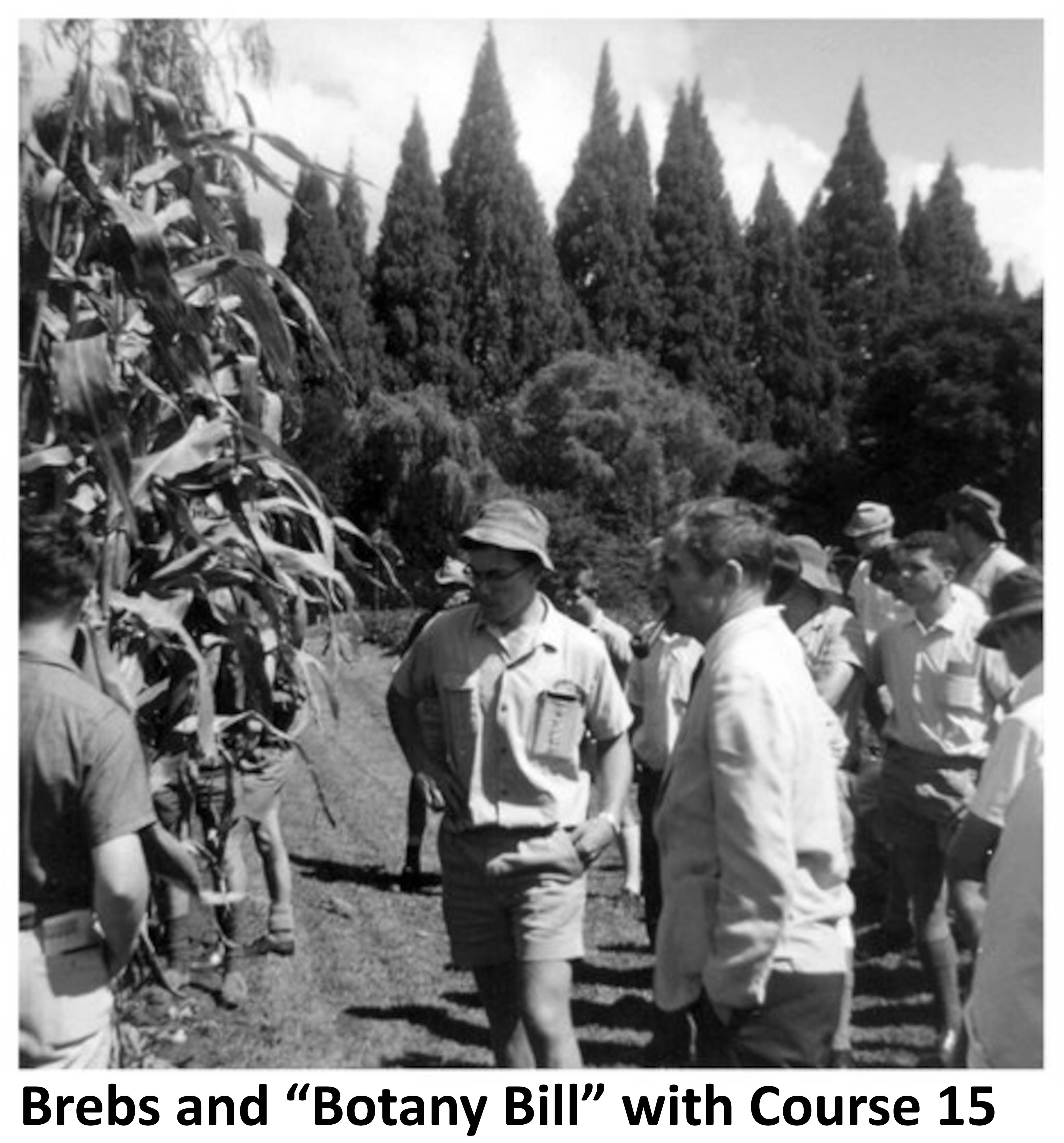
He enrolled at Gwebi with Course 15 and was known as 'Brebs'. He graduated in 1965 with a First Class Diploma with a distinction in Animal Husbandry and a Lord Acton Prize for Animal Husbandry.
After graduating he worked with his brother Chris on the family farm in the Figtree area. In 1968 he married Jen and they had three sons, Trevor, Grant and Simon.
At this time the family bought an irrigation plot on the Mananda Dam. Ian ran this, growing maize and winter wheat for a couple of years. He also grew maize for the cattle on the Figtree and Luchaby Ranches. Ian took an active role in community life - being on the local ICA Committee, Police Reserve and Farmers Association as well as Chairman of REPS Board of Governors.
Matabeleland farmers were armed with automatic weapons during 1983 in an effort to curb dissident activity that commenced after 1980 Independence. More than 100 people, 23 of them white, had died so Ian moved his family to Bulawayo as security continued to deteriorate.
On one Tuesday he was ambushed by about eight gunmen who had waited at a cattle watering point on Lushabi Outspan Farm, Figtree, 65 km west of Bulawayo. He was shot in the chest and four spent cartridges were found at the scene.
Ian is survived by two of his sons and two grandchildren.
Steve Bennett from Old Prunitians, CFU and media.
Mr Roy E. G. Futter (aged 46)
9th May, 1987.
Course 10.
As the sun sank below the horizon after tennis at Somabhula Club, the braais were lit and after supper was eaten most of the members gravitated towards the clubhouse after tennis. Gunfire was heard that Saturday night at about 9.30 p.m.
A gang of four Terrorists – the modern day “dissidents” - had been observing the club since midday and no one paid any attention to the stranger lounging around the blue Datsun 120Y. The gang waited patiently until night fell and then approached the club in the darkness with their weapons, walked around the side to an open window and fired automatic bursts from AK47s at Roy Futter, Thys Lourens, Allen Dicks and Glyn Williams who were playing darts in the club close to this window. Thys, Allen and Glyn were all killed instantly in this fusillade of bullets but Roy was not wounded and realised that he needed to get the five women and youngster to safety so quickly ushered them to the shower rooms where he locked them in for their safety. Roy then returned to the now darkened club to try and secure the situation but was gunned down by the gang as he attempted to close the door to the bar. His son Greg, 11 at the time, lying on the floor pretending to be dead, witnessed his father being shot. Frank Mkwebu, the club barman, took this opportunity to try and escape but was shot and wounded in his leg and was dragged back into the club but in spite of his wounds managed to hide by dragging himself under a table when the terrorists were distracted. The gang, now intent on escaping, broke into another vehicle looking for a weapon but soon drove off in their own car into the darkness.
Several people, on hearing the gunfire from the club, had telephoned the Police in Gweru but it would take some time for them to organise themselves and then drive the 32 kms to Somabhula. In the meantime, Roy Paul, a neighbouring farmer who had been phoned at home, cautiously approached the club and released the traumatised group from the shower room and together with Greg Futter were taken to a place of safety. Frank Mkwebu was also rescued and transported by ambulance to Gweru Hospital for treatment to the wounds in his right leg.
The information that was pieced together by the community, the Police and the surviving witnesses was that this gang was led by the infamous Richard Gwesela, a former ZIPRA terrorist who, in spite of the cessation of the war, the advent of independence and the unity accord, refused to hand in his weapons, gathered up a gang of like-minded criminals, and continued with his reign of terror killing both black and white Zimbabweans in the Midlands area. The illegal squatters on Ruby Ranch, a Lonrho property managed by Glyn Williams, had sent threats and death notices to Glyn and it was surmised that Gwesela had been contacted by these squatters to murder him as Glyn had been attempting to have them evicted. Regardless of this supposition, the outcome was that tragically the squatters got their wish with the death of Glyn along with the murder of three other good men.
Richard Gwesela and his gang were not apprehended by the Police and just ten days later this gang murdered Roy Dabbs, another farmer in the Lower Gweru farming district. The gang went on to murder at least another twenty-one victims.
Roy Futter (46) had been born and bred in Somabhula and after schooling at Chaplin, attended Gwebi Agricultural College with Course 10. After graduating in 1960 he worked on several farms in the district before spending fifteen years as an Irrigation Engineer with Martin Sacchi in Gweru. Roy had only returned the year before to Lewis Farm, the family property owned by his grandfather, where he had just embarked on a dairy project. Roy was a keen sportsman representing Rhodesian Country Districts at Cricket and gained his Zimbabwe colours for shooting. Roy was survived by his three children, Grant, Linda and Greg, and his fiancée Lizzy.
Abbreviated from a report compiled by Colin Lowe after consulting Ellen Hapelt, Dr Drew Shaw and Eastland Collen.
Mr Martin Geoffrey Olds (aged 43).
18th April, 2000.
Gwebi graduate, Course 28, 1978, from Bubi-Umguza.
A scorched and bullet-scarred farmhouse showed the struggle mounted by Martin during a two-hour siege before he was killed by 70 armed attackers.
Gunmen launched a dawn raid on his home at Compensation Farm in Matabeleland, 400 miles south-west of the capital, Harare. He was repeatedly wounded during a gun battle that left his right leg shattered. However, he continued to fight his assailants and wounded two before succumbing.
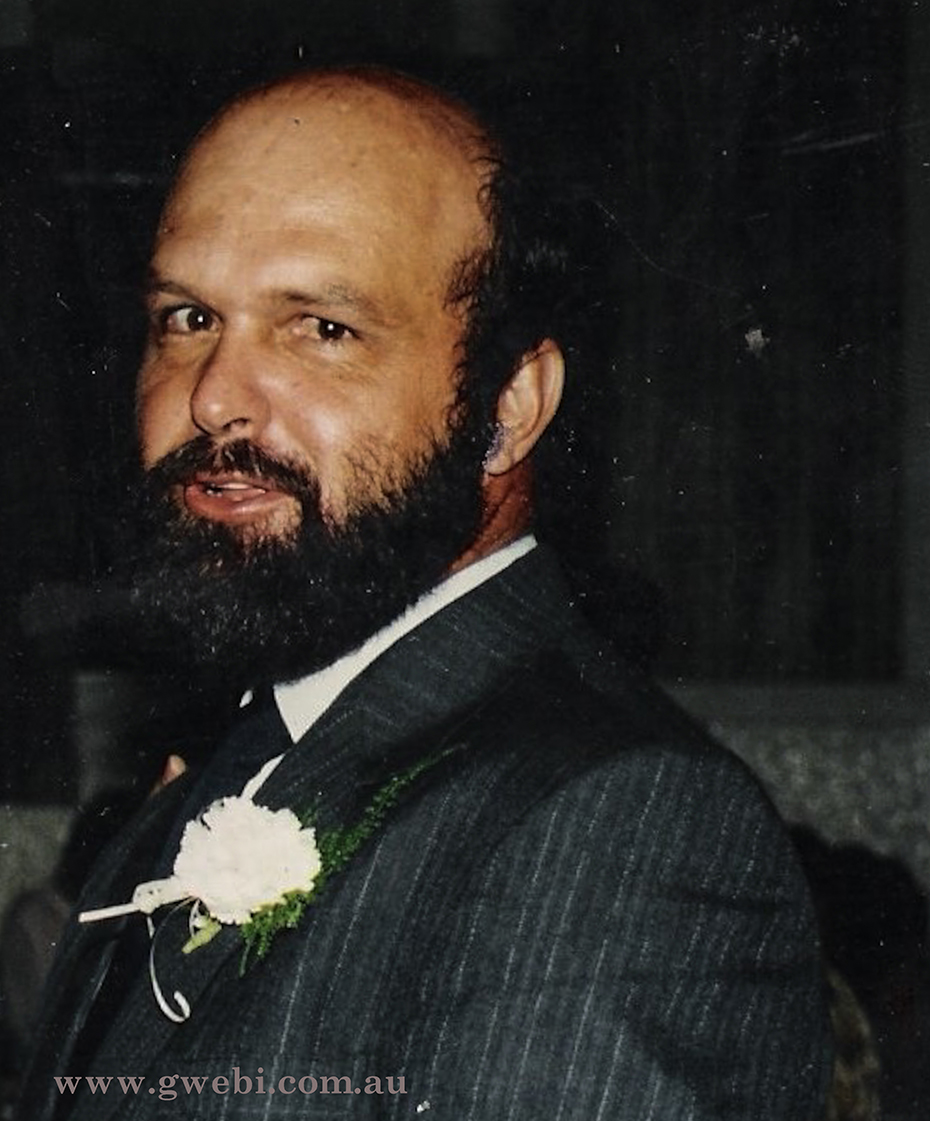 Mr Olds' death came barely a day after President Robert Mugabe assured the Commercial Farmers' Union that the crisis, which has seen squatters occupy more than 1,000 farms, would soon be over. The tragedy also followed the murder on Saturday of David Stevens, another white farmer.
Mr Olds' death came barely a day after President Robert Mugabe assured the Commercial Farmers' Union that the crisis, which has seen squatters occupy more than 1,000 farms, would soon be over. The tragedy also followed the murder on Saturday of David Stevens, another white farmer.
Martin Olds had previously received death threats from self styled ‘war veterans’ who were brought by bus to the area. With rising concern, on the 17th April he took Kathy and their two teenage children through to Bulawayo whereupon he returned to the farm.
The next morning he told a neighbouring farmer during a desperate radio conversation at about 6 a.m.: "I've been shot and I need an ambulance". His attackers had arrived about 30 minutes earlier with automatic weapons. They burst through his security fence to surround the house.
Mr Olds defended himself with a shotgun and a hunting rifle. His right leg was broken but he made his own splints and continued to fight back. He fled through the back door after petrol bombs were thrown through the windows, and was shot in his other leg. He was caught, beaten and then shot in the head.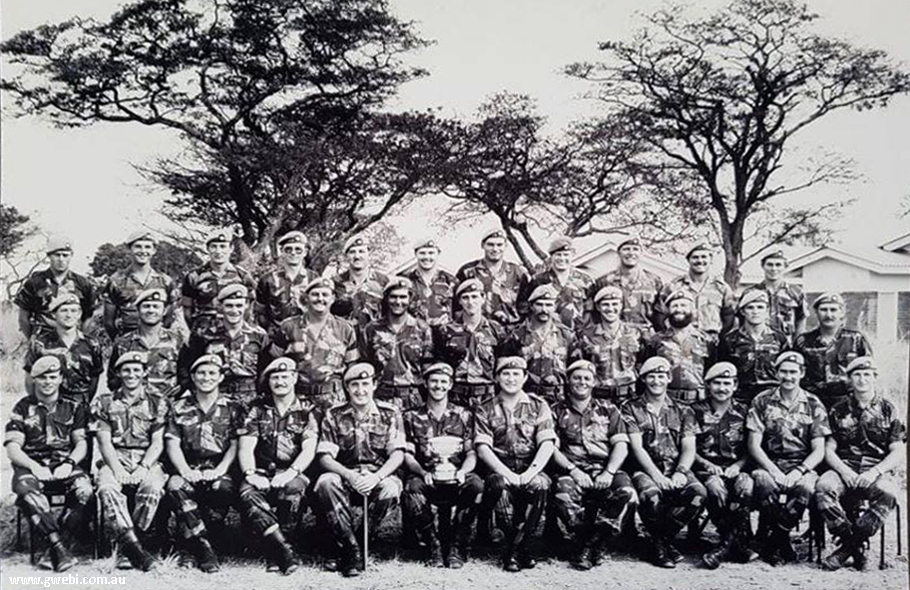
As the alarm was raised, nearby farmers tried to stabilise the situation. Guy Parkin, 20, approached the farmhouse at 6.45 a.m. He said: "When I got there, there were lots of cars outside his gate. When I asked one of the war veterans what was going on, a shot was fired over me."
Mr Parkin, fearing for his life, hastily retreated. He said most of the attackers were drunk and waving empty beer bottles. About 45 minutes later, Mr Olds was dead. Craig Wood, a local farmer, saw his body and said he had been "severely beaten". Police did not appear until 9.30 a.m., when the attackers did flee.
David Coltart, legal secretary for the opposition Movement for Democratic Change and a prominent lawyer in Matabeleland, said the attack was organised by Comrade Jesus, a notorious leader of farm invasions who had been brought into the area. Most of the assailants were from the majority Shona tribe.
The local people are Ndebele speakers with a deep loathing for Mr Mugabe's government. Local farmers suspect that shock troops of the ruling Zanu-PF party are being brought into the area to cause renewed unrest. Mr Olds was alone in the farmhouse when he was attacked as he had evacuated his family to Bulawayo after being warned that he was a likely target for the mob of between 100 and 300 supposed war veterans who had been bused into Matabeleland.
An ambulance treated two of his assailants for shotgun wounds to the legs and the medical crew confirmed that their patients were from the Shona tribe.
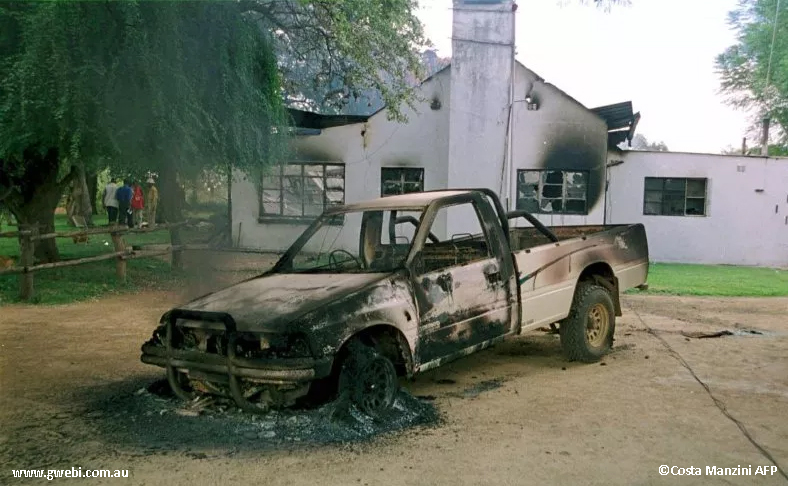 His mother was killed within a year of his death. She was shot 15 times. Gloria Olds, aged 68, was ambushed at the gates of her homestead on Silverstreams Farm, 350 miles south-west of Harare. She was the seventh white farmer killed in twelve months. Although Silverstreams was not among the 900 white farms occupied by squatters at that time, neighbours believe the murder of Mrs Olds was a political killing. The entire farming community around Nyamandhlovu, which has been particularly affected by the land invasions, joined a search for the killers, fanning out across the bush in four-wheel-drive vehicles, guided by two light aircraft.
His mother was killed within a year of his death. She was shot 15 times. Gloria Olds, aged 68, was ambushed at the gates of her homestead on Silverstreams Farm, 350 miles south-west of Harare. She was the seventh white farmer killed in twelve months. Although Silverstreams was not among the 900 white farms occupied by squatters at that time, neighbours believe the murder of Mrs Olds was a political killing. The entire farming community around Nyamandhlovu, which has been particularly affected by the land invasions, joined a search for the killers, fanning out across the bush in four-wheel-drive vehicles, guided by two light aircraft.
The getaway vehicle was spotted heading north towards Tsholotsho and a witness told farmers that it contained three men. But it was soon lost amid the winding tracks and dense bush. Police officers were sent to the scene, though farmers bitterly remember that the killers of Martin Olds were allowed through a police road block while making their getaway. No one has been convicted for his murder, or any of the others.
Sixteen years later, on the eve of the anniversary of Martin's death, a tribute has been posted by a former neighbour:
I will not be celebrating Zim independence tomorrow. I will be remembering and saluting Martin Olds, who was murdered on Independence Day, 2000. Martin was a good family friend - the man who didn't wait for back up when my Dad, John Norvall, was ambushed and killed by dissidents in 1987 - he raced from his farm to ours to help Dad. Dad had bled to death by the time Mart arrived, but he disturbed the dissidents at the scene of the crime, and wounded one of them as they fled.
Martin was awarded a medal for bravery (by the President of Zimbabwe) for another act of bravery - again, not waiting for back up, Martin leapt to his friend's rescue when George Parkin was grabbed by a huge crocodile. A tug of war ensued - which Martin eventually won. He joked that he decided it was easier to face the croc than George's wife, Lesley Elizabeth Parkin !!!
Twenty years later tributes to Martin flow in the media as we remember this third generation legend who has touched so many of us.
His wife Kathy, had contracted severe polio as a one year old from which she never fully recovered. Through her life she  has walked with calipers and walking sticks. She grew up in a loving household with two older, hardy brothers who gave her no quarter or allowance for her disability. She attended Thornhill High School in Gwelo. Kathy set about her life and career with great determination and as fate would have it she met the indominable Martin Olds and they fell in love and got married. By the grace of God, Martin and Kathy were blessed with two wonderful children and they were approaching their 25th wedding anniversary. Martine was 17 when Martin was murdered and Angus was 14.
has walked with calipers and walking sticks. She grew up in a loving household with two older, hardy brothers who gave her no quarter or allowance for her disability. She attended Thornhill High School in Gwelo. Kathy set about her life and career with great determination and as fate would have it she met the indominable Martin Olds and they fell in love and got married. By the grace of God, Martin and Kathy were blessed with two wonderful children and they were approaching their 25th wedding anniversary. Martine was 17 when Martin was murdered and Angus was 14.
Kathy, also third generation, and the children left for the UK within weeks with very little and things in the early years were certainly not easy. She had a small seond hand vehicle which was converted to cater for her disability. This gave her mobility and the freedom to travel to her place of work as a legal secretary. She stays with Martine and her husband.
This report is on a separate page, click here.
Steve Bennett
The comprehensive report on Farmers and their families that were victims on their farms during the Bush War, after Independence, by Dissidents and Farm Invasions can be viewed here.
The Roll of Honour of all casualties of the Rhodesia Security Forces during the Rhodesian Bush War can be viewed here.
The menu to select other Roll of Honours for the Rhodesian Bush War can be viewed here.
DISCLAIMER
Information and content has been supplied by other parties so no warranty (express or implied) is given to its completeness, accuracy or fitness for a particular purpose.
Return to top of page and Menus
